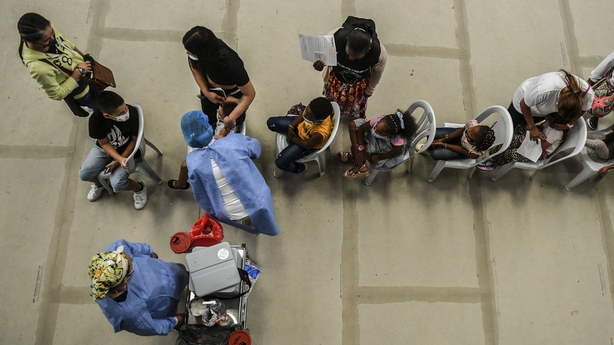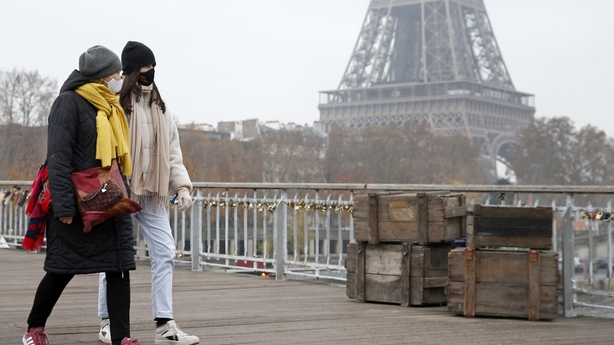The Netherlands will go into "lockdown" over the Christmas period to try to stop a surge of the Omicron coronavirus variant, Dutch Prime Minister Mark Rutte said this evening.
All non-essential shops, restaurants, bars, cinemas, museums and theatres must shut from tomorrow until 14 January, while schools must close until at least 9 January, Mr Rutte said.
The number of guests that people are allowed in their house is also being cut from four to two, except for on Christmas Day.
"I stand here tonight in a sombre mood. To sum it up in one sentence, the Netherlands will go back into lockdown from tomorrow," Mr Rutte told a televised press conference.

"The Netherlands is again shutting down. It is inevitable with the fifth wave and with Omicron spreading even faster than we had feared. We must now intervene as a precaution," he said.
The head of the Dutch outbreak management team, Jaap van Dissel, told the news conference that the Omicron variant would overtake the Delta strain to become dominant in the Netherlands by the end of the year.
"Between Christmas and the turn of the year the Omicron variant will become dominant," Mr van Dissel told the news conference.
"We know that the variant can outflank built-up defences from previous infections or previous vaccinations, especially if that was some time ago."
A failure to act now would likely lead to "an unmanageable situation in hospitals", which have already scaled back regular care to make space for Covid-19 patients, Mr Rutte said.
Infections in the Netherlands have dropped from record levels in recent weeks after the introduction of a night-time lockdown late last month. The Omicron variant arrived as the country was already battling a wave in coronavirus infections.
Cases of the variant have surged since it was first found in the Netherlands three weeks ago, while hospitals are struggling with the large numbers of Covid-19 patients in their wards, near the highest levels this year.
While more than 85% of the Dutch adult population is vaccinated, fewer than 9% of adults have had a booster shot, one of the lowest rates in Europe.
Today, the National Institute for Public Health (RIVM) reported a total of over 2.9 million Covid-19 cases since the start of the pandemic, with 20,420 reported deaths. There were 14,616 new infections reported in the last 24 hours in the country.
Long queues developed outside shops earlier today as people rushed to do last-minute Christmas shopping as reports of the new measures emerged.
The main shopping street in Leiden, 20km from The Hague, was thronged with people looking for last-minute gifts. Some stores, selling toys or luxury skin care and cosmetics, had queues outside.
Municipal authorities in the port city of Rotterdam urged shoppers via Twitter to stay at home because the city centre was "too busy".
The Netherlands relaxed most social distancing measures in September, but by November infections were back up to record levels of more than 20,000 a day.
The restrictions have been unpopular, with riots breaking out in Rotterdam, The Hague and other cities in late November.
Omicron doubling in areas with local spread - WHO

The Omicron coronavirus variant has been reported in 89 countries and the number of cases is doubling in 1.5 to three days in areas with community transmission, the World Health Organization (WHO) has said.
Omicron is spreading rapidly in countries with high levels of population immunity, but it is unclear if this is due to the virus' ability to evade immunity, its inherent increased transmissibility or a combination of both, the WHO said in an update.
The agency designated Omicron a variant of concern on 26 November, soon after it was first detected, and much is still not known about it, including the severity of the illness it causes.
"There are still limited data on the clinical severity of Omicron," the WHO said.
"More data are needed to understand the severity profile and how severity is impacted by vaccination and pre-existing immunity.
"There are still limited available data, and no peer-reviewed evidence, on vaccine efficacy or effectiveness to date for Omicron."
The WHO warned that with cases rising so rapidly, hospitals could be overwhelmed in some places.
"Hospitalisations in the UK and South Africa continue to rise, and given rapidly increasing case counts, it is possible that many healthcare systems may become quickly overwhelmed," it said.
We need your consent to load this rte-player contentWe use rte-player to manage extra content that can set cookies on your device and collect data about your activity. Please review their details and accept them to load the content.Manage Preferences
10% of new French suspected to be Omicron
The Omicron coronavirus variant is now suspected to be responsible for up to 10% of new confirmed Covid-19 cases in France, according to the country's health minister.
Olivier Veran said that the new variant is the main reason behind plans for stricter health requirements for entering some venues.
The new vaccination pass set to be introduced early next year will require people to show proof of vaccination to enter restaurants and long-distance public transport.
Under the current regulations, a recent negative Covid-19 test is sufficient for entering many indoor public places.
Plans for the new pass were announced by Prime Minister Jean Castex yesterday.
Speaking on France Inter radio, Mr Veran also said he expected that early next week the French health authority will give the green light to start offering coronavirus vaccinations to children aged five to 11.

For now, only children with serious health conditions or additional health risks can be given the shots.
Mr Veran said he hoped that voluntary vaccination for all children could start on 22 December.
Meanwhile, Ukraine has detected its first case of the Omicron variant, Health Minister Viktor Lyashko has said.
The infected person recently returned to Ukraine from the United Arab Emirates, Mr Lyashko said on Facebook.
So far, Ukraine has reported 3.6 million cases of Covid-19 and 92,929 deaths.

